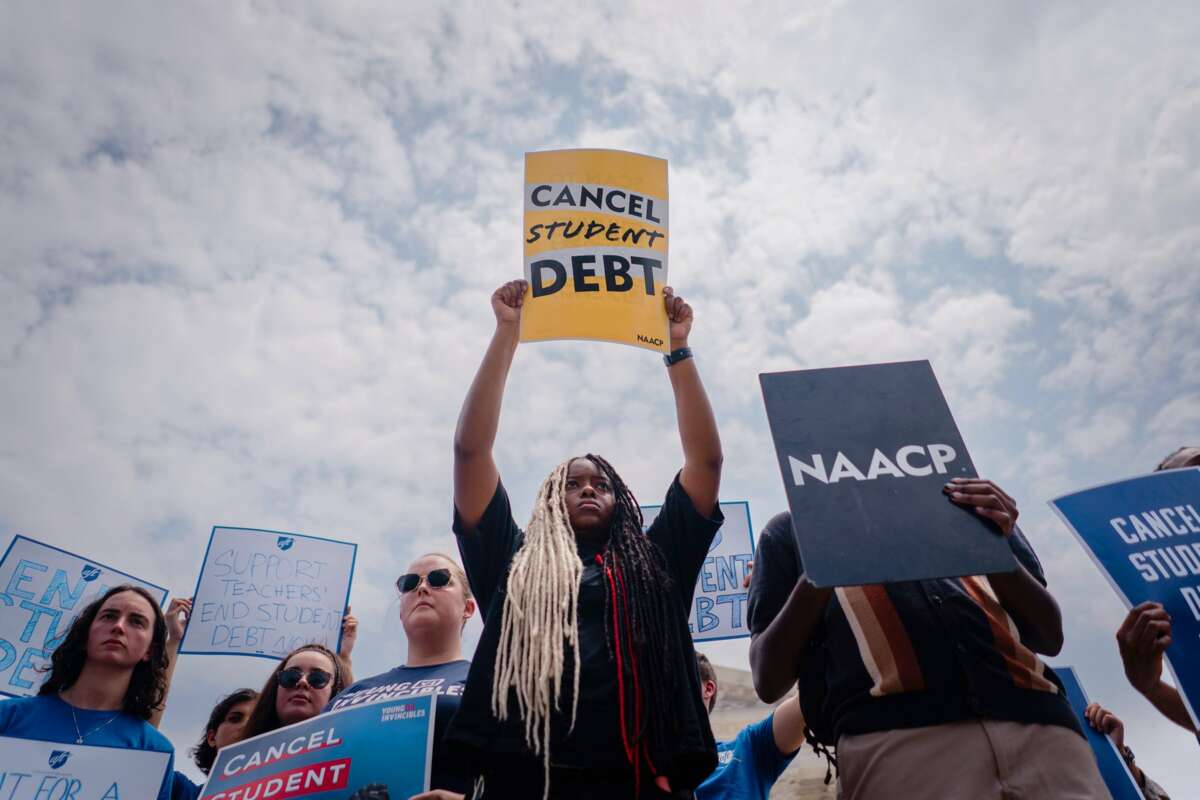Starting this year, employers can match employees’ student loan repayments as 401(k) contributions, a policy that experts say can be a “game changer” for Black women, who have the highest student loan debt on average.
When someone makes a student loan payment, their employer can contribute that same amount of money to the employee’s retirement plan under Section 110 of a federal law known as the SECURE Act 2.0. The policy, which stands for Setting Every Community Up for Retirement Enhancement, “permits an employer to make matching contributions under a 401(k) plan, 403(b) plan, or SIMPLE IRA with respect to ‘qualified student loan payments.’”
Signed into law in 2022, the contribution option comes at a time when many Americans are burdened with student loan debt — especially women. Up to 61.4 percent of women with bachelor’s degrees have federal student loans, compared with 52.2 percent of men who hold a bachelor’s degree, according to the Education Data Initiative. The research institution, which focuses on collecting and distributing U.S. education system statistics, reported that Black women have the highest amount of debt — $29,051 — compared with other groups of women.
“This outsized burden of student loans, coupled with the wage gap between men and women — particularly women of color — exacerbates the gap that already exists between these groups in retirement contributions, savings and confidence,” said Sen. Benjamin L. Cardin, a Maryland Democrat and member of the Senate Finance Committee who has supported similar legislation in the past.
This latest provision “aids those who are missing out on available matching contributions for retirement plans because they must prioritize paying off their student debt,” Cardin told The 19th.
Up to 72 percent of non-retired people had a retirement savings account in 2022, but only 31 percent of them felt that their retirement savings were on track, down from 40 percent in 2021, according to data from the Federal Reserve. Sixty percent of Black non-retirees have a retirement account, but only 22 percent of them felt on track for retirement.
Financial advisers say debt plays a role in that. Raya Reaves financially coaches women and creates personalized budget plans for them through her company, City Girl Savings. After creating their budgets, she works with clients to dedicate remaining funds to paying down debt.
“I have some clients who, 25 percent of their income is going to debt payments. Imagine if that money was back in their budget and they can save or invest or put it towards retirement,” Reaves said.
Once they have gotten living expenses and debt covered, she pivots to having the clients think about building wealth and says, “Contributing to a retirement plan is one of the best ways to do that.”
Data from the Federal Reserve shows that the racial wealth gap persists, even as Black people’s ownership of homes, stock and business increased between 2019 and 2022. Median wealth — or the amount of assets held by a typical family — was $536,000 for Asian families; $285,000 for White families; $61,600 for Hispanic families; and $44,900 for Black families. The data said Native American families “had median wealth similar to the typical Black or Hispanic family, rather than the typical White or Asian family,” but did not provide a specific dollar amount.
When contributing to a retirement plan, assets grow tax free and interest accrues over time, according to the U.S. Internal Revenue Service — making small, regular contributions develop into “significant retirement savings.” There can even be retirement plan beneficiaries, or someone who inherits the account when the original owner dies, a way to build generational wealth.
Reaves said the SECURE Act will be a strong benefit, and she sees more employers embracing it in the future.
“It’s still a form of you investing and saving for retirement — which is phenomenal — not as much as if you were basically doubling what you’re putting in your retirement plan, but at least your employer is putting something on your behalf so you don’t have to feel behind when it comes to retirement,” Reaves said.
This policy applies only to companies that already offer matching contributions. Gloria L. Blackwell, the CEO of the American Association of University Women, commends the policy for the positive impact it could have, but recognizes its limited scope.
“If it’s adopted by more employers, it could certainly be a game changer for so many women who’ve really been locked out of saving for retirement but, in essence, it doesn’t do a whole lot to address what is already the gender pay gap,” she said. Blackwell also explained that even with the policy, there were limits to what employees could expect “because it’s voluntary, and it will be dependent upon the capacity, the decisions, the values and even the whims of employers.”
Ericka Hines, the founder of Every Level Leadership, a diversity, equity and inclusion and workplace culture consulting firm, believes this policy supports equity and can be especially beneficial to Black women. She recommends interested employees navigate the conversation amongst colleagues before bringing it higher up.
“Build a coalition. Have the coalition speak so that it’s not one person, but many voices. Have the data,” Hines explained, suggesting having the employers understand, on a granular level,how student loan debt impacts different kinds of people. “The student loan issue isn’t just for folks who are in their 20s. It’s people who are in their 20s to people who are in their 60s and 70s who are still paying on loans and having it affect their Social Security.”
Media that fights fascism
Truthout is funded almost entirely by readers — that’s why we can speak truth to power and cut against the mainstream narrative. But independent journalists at Truthout face mounting political repression under Trump.
We rely on your support to survive McCarthyist censorship. Please make a tax-deductible one-time or monthly donation.
